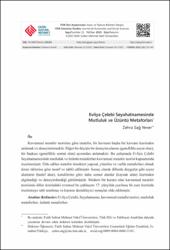| dc.contributor.author | Yener, Zehra Sağ | |
| dc.date.accessioned | 2023-12-26T08:33:42Z | |
| dc.date.available | 2023-12-26T08:33:42Z | |
| dc.date.issued | 2023 | en_US |
| dc.identifier.citation | YENER, Zehra Sağ. "Evliya Çelebi Seyahatnamesinde Mutluluk ve Üzüntü Metaforları." FSM İlmî Araştırmalar İnsan ve Toplum Bilimleri Dergisi." 22 (2023): 315-347. | en_US |
| dc.identifier.uri | https://dergipark.org.tr/tr/pub/fsmia/issue/81557/1408496 | |
| dc.identifier.uri | https://hdl.handle.net/11352/4703 | |
| dc.description.abstract | Kavramsal metafor teorisine göre metafor, bir kavramı başka bir kavram üzerinden
anlamak ve deneyimlemektir. Diğer bir deyişle bir deneyim alanını (genellikle soyut olan),
bir başkası (genellikle somut olan) açısından anlamaktır. Bu çalışmada Evliya Çelebi
Seyahatnamesinde mutluluk ve üzüntü metaforları kavramsal metafor teorisi kapsamında
incelenmiştir. Elde edilen metafor örnekleri yapısal, yönelim ve varlık metaforları olmak
üzere türlerine göre tasnif ve tahlil edilmiştir. Sonuç olarak dillerde duygular gibi soyut
alanların (hedef alan), kendilerine göre daha somut alanlar (kaynak alan) üzerinden
algılandığı ve deneyimlendiği görülmüştür. Modern bir kuram olan kavramsal metafor
teorisinin diller üzerindeki evrensel bu yaklaşımı 17. yüzyılda yazılmış bir eser üzerinde
incelemeye tabi tutulmuş ve kuramı destekleyici sonuçlar elde edilmiştir. | en_US |
| dc.description.abstract | According to conceptual metaphor theory, metaphor is understanding and
experiencing a concept through another concept. In other words, it is understanding one
field of experience (usually abstract) in terms of another (usually concrete). In this study,
metaphors of happiness and sadness in Evliya Çelebi’s Seyahatname were examined
within the scope of conceptual metaphor theory. The obtained metaphor examples
were classified and analyzed according to their types as structural, orientational and
ontological. As a result, it was observed that abstract domains such as emotions (target
domain) in languages are perceived and experienced through more concrete domains
(source domain). This universal approach of conceptual metaphor theory, which is a
modern theory, on languages was analyzed on a work written in the 17th century and
results supporting the theory were obtained. | en_US |
| dc.language.iso | tur | en_US |
| dc.publisher | FSM Vakıf Üniversitesi | en_US |
| dc.relation.isversionof | 10.16947/fsmia.1408496 | en_US |
| dc.rights | info:eu-repo/semantics/openAccess | en_US |
| dc.subject | Evliya Çelebi | en_US |
| dc.subject | Seyahatname | en_US |
| dc.subject | Kavramsal Metafor Teorisi | en_US |
| dc.subject | Mutluluk Metaforları | en_US |
| dc.subject | Üzüntü Metaforları | en_US |
| dc.subject | Conceptual Metaphor Theory | en_US |
| dc.subject | Metaphors of Happiness | en_US |
| dc.subject | Metaphors of Sadness | en_US |
| dc.title | Evliya Çelebi Seyahatnamesinde Mutluluk ve Üzüntü Metaforları | en_US |
| dc.title.alternative | Metaphors of Happiness and Sadness in Evliya Çelebi’s Seyahatname | en_US |
| dc.type | article | en_US |
| dc.relation.journal | FSM İlmî Araştırmalar İnsan ve Toplum Bilimleri Dergisi | en_US |
| dc.contributor.department | FSM Vakıf Üniversitesi, Rektörlük, FSM İlmî Araştırmalar İnsan ve Toplum Bilimleri Dergisi | en_US |
| dc.contributor.authorID | https://orcid.org/0009-0004-0606-3165 | en_US |
| dc.identifier.issue | 22 | en_US |
| dc.identifier.startpage | 315 | en_US |
| dc.identifier.endpage | 347 | en_US |
| dc.relation.publicationcategory | Makale - Ulusal Hakemli Dergi - İdari Personel ve Öğrenci | en_US |
| dc.contributor.institutionauthor | Yener, Zehra Sağ | |



















